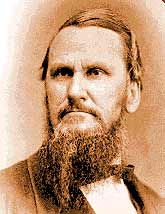I have been disappointed in several instances with what I have read in the third volume of Philip Schaff's masterful work, 'The History of the Christian Church' ('Nicene and Post-Nicene Christianity: A.D. 311-600'). While I was pleasantly surprised with the revelations (pun intended) found in the first volume detailing the Apostolic Age and read through the accounts of the German and Swiss Reformations with an eagerness usually reserved for one of C. S. Lewis' apologetic masterpieces, I am troubled by not a few of the issues raised by Schaff in his Nicene-era account.
The first point of contention arises in his discussion of the manner in which Christianity--primarily once adopted by Constantine--influenced life in the Roman Empire. Specifically, he details how many of the early Christians began to question their hand in slavery and realised the obvious (according to Schaff) incongruity it held with the true religion. The early Church Fathers, we are told, began to advocate gradual emancipation and preached that to follow Christ meant to divest oneself from such an abominable institution.
I will not invest myself in a restatement of the arguments made by R. L. Dabney in his nearly perfect treatise describing the fidelity of the instiution to Scripture. He removes all doubt as to the Bible's position in 'A Defence of Virginia and the South.' Dabney's work should be the genesis for any honest effort at ascertaining the morality of the Peculiar Institution.
I reckon my disappointment is more with Schaff than with the early Christians. Unlike the fourth century Believers, Schaff had access to the Canon and, therefore, should have known better than to state the antithesis of revealed truth. Paul and Peter, men in whom we could place confidence regarding an understanding of God's economy, were quite clear regarding the slave/ master relationship and the institution of slavery itself.
Slaves are never instructed to flee and masters are never directed to free their slaves. Rather, each is admonished to conduct themselves in a Christian manner within the confines of the relationship!
Slavery is everywhere in the Bible supported as a lawful and moral institution and to suggest otherwise is errant.
Another aspect of Schaff's work that has distressed me is his assertion regarding his account of the beginning of the persecution of heretics by the early church (following its marriage to the civil government).
To wit: 'The church, indeed, steadfastly adhered to the principle that, as such, she should employ only spiritual penalties, excommunication in extreme cases; as in fact Christ and the apostles expressly spurned and prohibited all carnal weapons, and would rather suffer and die than use violence.'
Again, such an absolute statement is not supported by a clear understanding of Scripture. 'So he [Jesus] made a whip out of cords, and drove all from the temple area, both sheep and cattle; he scattered the coins of the money changers and overturned their tables.'
To be certain, this should not be contstrued to diminish Schaff's work. It is not infallible (as is Scripture) after all. The errors in judgement and interpretation are magnified only because the remainder of the work is so superlative.
Friday, October 21, 2005
Wednesday, October 05, 2005
12 October 2005
'According to Libanius it was a principle with [Julian the Apostate], that fire and sword cannot change a man's faith, and that persecution only begets hypocrites and martyrs. Finally, he doubtless perceived that the Christians were too numerous to be assailed by a general persecution without danger of a bloody civil war. Hence, he oppressed the church "gently," under show of equity and universal toleration. He persecuted not so much Christians as Christianity, by endeavouring to draw off its confessors. He thought to gain the result of persecution without incurring the personal reproach and the public danger of persecution itself.' -- Philip Schaff, History of the Christian Church, vol. III, 'Nicene and Post-Nicene Christianity, A.D. 311 - 600.'
(Strangely familiar, is it not?)
(Strangely familiar, is it not?)
Subscribe to:
Comments (Atom)





